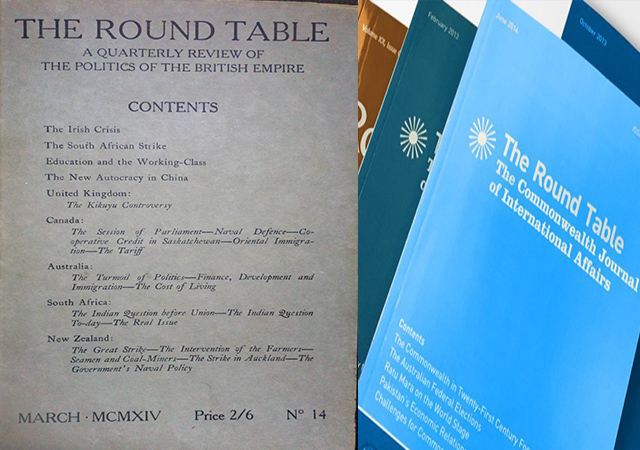 The Round Table Review in 1914 and today's Round Table Journal.
The Round Table Review in 1914 and today's Round Table Journal.
[These excerpts are from a book review which is in the current edition of The Round Table: International Journal of Commonwealth Affairs.]
This book perfectly illustrates a key historical phenomenon, namely that after the passage of 100 years the world can change so much that projects and purposes that may have seemed to be truly important can later seem so hopelessly inconsequential. Reading these pages, the reader can never escape the transformations that have taken place in the intervening period, transformations that render so many of the assumptions of its actors entirely irrelevant. The Round Table movement was founded by a group of imperialists, many of them connected with Milner and his Kindergarten in South Africa, who were convinced that the federation of the British Empire was both practical and necessary, that such a federation could ultimately embrace an Anglophone world (therefore including the United States), and that it could then direct global affairs to such an extent that wars might become a thing of the past. A federated British Empire, bringing together countries on all five continents, could thus become a model of world government. The leading members of the group (notably Lionel Curtis) had a mystical, even spiritual, approach to such a consummation. Although others, such as Philip Kerr, may have been a little more sceptical of such a high-flown approach, still Curtis influenced many into thinking this was a practical ambition which they were almost duty-bound to pursue.
Curtis was an indefatigable traveller, moving around the Dominions of the British Empire establishing branches of the movement, networking with significant politicians, journalists and academics, and seeking to distribute propaganda for the cause. Many of the key figures whom he influenced were closely involved with the creation and political development of the federations that made up the Dominions, in Canada, more recently in Australia, and most significantly of all in the creation of the Union of South Africa after the Anglo-Boer War. Indeed, it may be said that one of the successes of the members of the Round Table movement was to influence the creation of the South African Union (after the idea of federation had been rejected). But the leading figures also gave a great deal of attention to the possibility of the emergence of a federal Britain, mainly as a means of solving the Irish nationalist ‘problem’. The movement, however, found it difficult to escape the fact that it was essentially elitist, a group of privileged, English-educated (almost entirely at Oxford) men (indeed almost exclusively male) who had to grapple with a series of crises. The greatest of these was of course the First World War (and few of them volunteered for the war, preferring to pursue their Round Table objectives), although both Ireland and India constituted critical road blocks on the route towards the goal of their ambition.
As well as facing these insuperable obstacles, the Round Tablers never managed to overcome the basic dilemma, whether the movement was to be a study and debating society or a propaganda organisation pursuing their internationalist political objectives. Many contemporaries rightly saw them as wholly impractical idealists, and it must have been obvious to most observers that their objectives were likely to remain entirely out of reach.
————————
At the end of the day, the Round Tablers’ greatest enduring influence may have been in founding The Round Table journal, which still survives as a scholarly publication dealing with Commonwealth and international affairs. Their role in the founding of the (now Royal) Institute of International Affairs (Chatham House) may be another enduring legacy, although it might well have been created without them. Thus, their ambitions were intended to be entirely practical, but their effects may have been principally scholarly.
John M. MacKenzie is with the University of Lancaster.
[The Round Table Movement and the Fall of the ‘Second’ British Empire (1909–1919), by Andrea Bosco, Newcastle upon Tyne, Cambridge Scholars Publishing, 2017, ISBN 1443899712]
Related articles:
The Round Table Movement – Wikipedia
The Round Table Journal – Wikipedia
The Round Table website – news and views from around the Commonwealth
The Round Table: The Commonwealth Journal of International Affairs – current edition.



